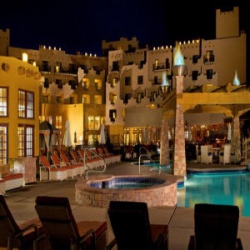The Pojoacque Pueblo Tribe received permission this week from the U.S. Department of the Interior it is eligible to sign a gaming compact with the state of New Mexico. The tribe has been pursuing a continuation of its gambling compact, but the state’s administration has resisted those attempts until now.
Stalled Negotiations between Tribe and State
The tribe and state have been working on a new compact for months, but the negotiations have been bitter. Each side claims the other is not working in good faith. Back in March, the Pojoaque Pueblo Tribe lost a lawsuit against the state of New Mexico. The lawsuit stated that Susana Martinez’s administration had tried to impose new taxes on the casino’s operation, but had not given additional benefits as compensation.
The state claimed it had wanted a larger share of revenues, but they offered exclusivity in exchange for the uptick in taxes. The tribe claims exclusivity offers no real advantages, because of the nature of the New Mexico gaming market. When the lawsuit was thrown out back in March 2014, the judge did not address the merits of either claim. Instead, the state’s sovereignty precluded such a lawsuit. In making the ruling, the dispute automatically was referred back to the U.S. Department of the Interior, which has handled Indian affairs going back to the 19th century.
Buffalo Thunder Resort – Cities of Gold Casino
The Pojoacque Pueblo Tribe owns two casinos northwest of Santa Fe: Buffalo Thunder Resort & Casino and Cities of Gold Casino. The gaming compact for both of these gaming venues expires next year, at which point neither casino could operate legally. Due to a U.S. federal law established in a landmark 1989 Supreme Court case, Indian tribes have the right to open legal casinos, because their reservations are seen as sovereign land, but must come to an agreement with the surrounding state.
Therefore, the state of New Mexico and Pojoacque Pueblo Indians must come to a bargain. After the recent ruling by the Interior Department, the tribe now can submit a compact to the federal agency, which will review the plan. The administration of Susana Martinez will have 60 days from the filing of the plan to respond, after they review the plan. The final decision should be known in the coming months.
Alcohol Sales Also Being Disputed
More is being disputed than the taxes. The tribe wants the right to serve alcohol at their casinos, citing the ability of private-owned casinos in New Mexico to serve liquor on their gaming floor. George Riviera, the tribe’s president, said back in March that the current alcohol policy puts the Buffalo Thunder and Cities of Gold at a severe disadvantage, one which might mean the difference in survival or closure. The tribe says more customers will gravitate to the liquor-serving establishment, if the choice is between a dry casino and a wet casino.
At the moment, revenue sharing sites at 8%. Under the terms of the new deal proposed by the Martinez administration, the state would receive 9.5% of the revenues. Eventually, the number would balloon to 10.5%. The Pueblo Indians say such a number further marginalizes their operation, so the state is pushing them aside with a one-sided offer.
In most cases, the state and tribe are able to come to a working bargain. In this case, it appears that neither side is willing to budge, so the dispute will need to be settled by a third-party. That third party is the U.S. Department of the Interior’s Indian Affairs Division. Expect an answer to this question by early fall 2014.
The dispute is a microcosm of the non-Vegas gaming industry in the United States these days. Due to market saturation, many Indian casinos have faced declining revenues. In 1989, 2 states allowed casino gambling, while 38 U.S. states now have casinos.
With the recession causing a dip in revenues across the board, states have received fewer tax revenues at a time when most U.S. states are having budget shortfalls. Under the circumstances, state treasurers are likely to raise taxes, so the casino faces a loss of revenues on the customer-side and administration-side of the business. This exacerbates their problems, leading the casino operators to dig in their heels.
Such issues are not quite as common west of the Mississippi River, because the wider spaces means market saturation is less troublesome. States like New Mexico have begun to provide licenses to private gaming interests, though, which has caused a glut of gaming businesses on a more local level. Thus, the Pojoacque Pueblo casinos are facing pressures from rival operations in New Mexico, which might play by different rules.

